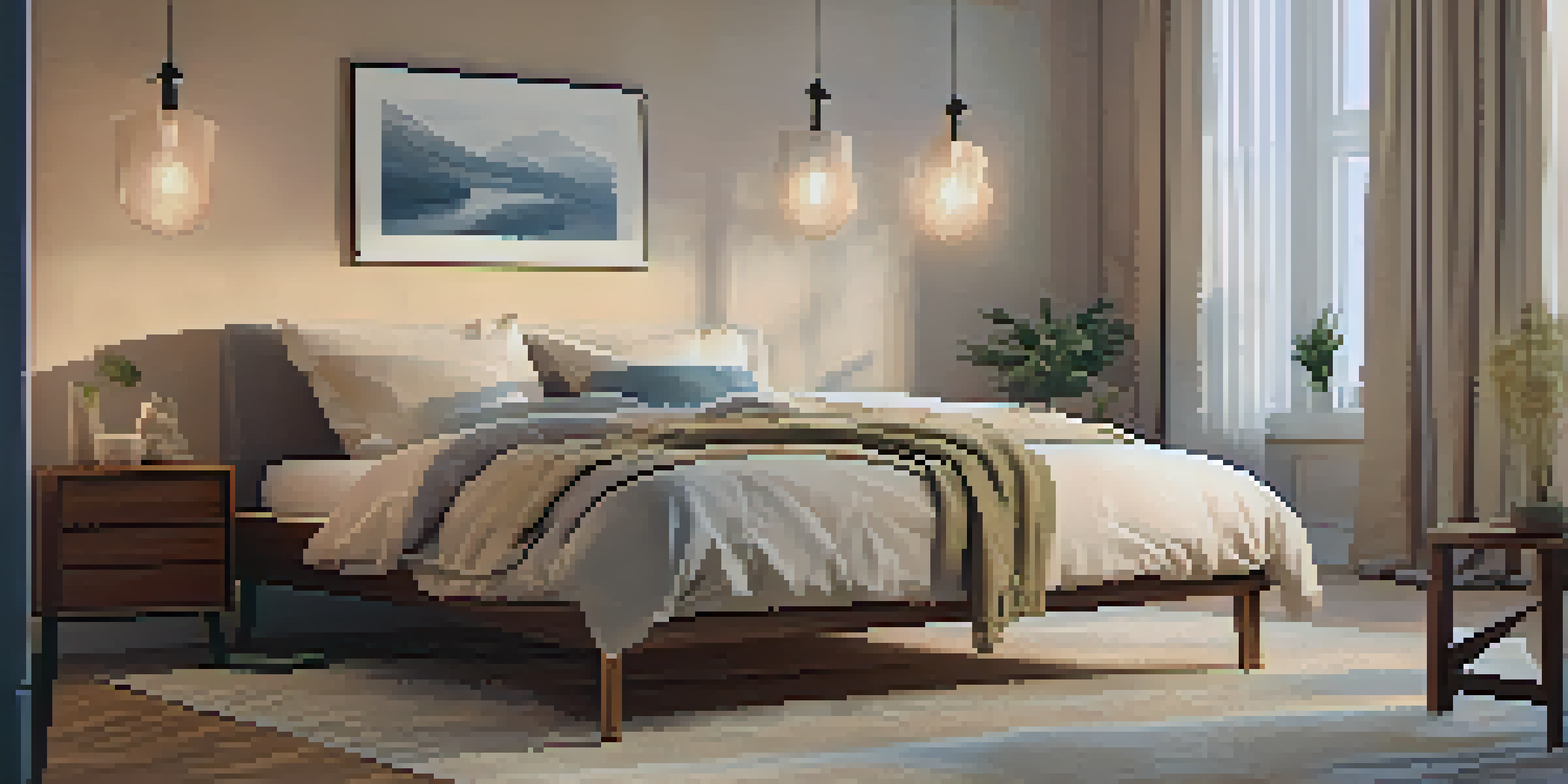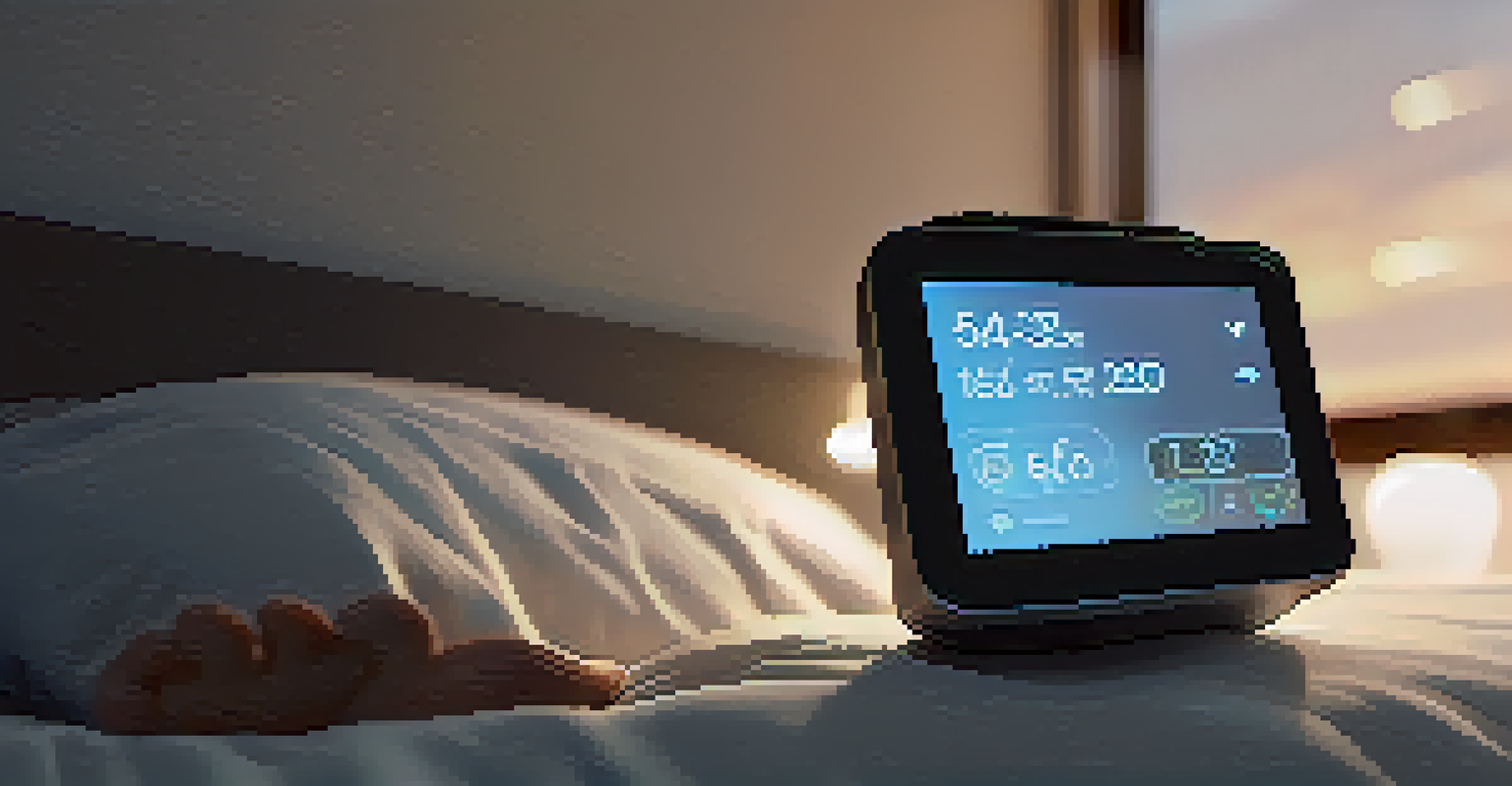The Role of Technology in Managing Sleep Disorders

Understanding Sleep Disorders and Their Impact
Sleep disorders are conditions that disrupt normal sleep patterns, affecting millions of people worldwide. Common types include insomnia, sleep apnea, and restless leg syndrome, each presenting unique challenges. The consequences of these disorders can be severe, leading to daytime fatigue, mood swings, and decreased productivity.
Sleep is the best meditation.
Many individuals suffering from sleep disorders often seek solutions to improve their quality of sleep. However, traditional approaches such as medication can have side effects and may not address the root of the problem. This is where technology steps in, offering innovative alternatives that can enhance sleep health.
By leveraging advancements in technology, patients can gain insights into their sleep patterns and overall health. This proactive approach not only aids in diagnosis but also empowers individuals to take control of their sleep hygiene.
Wearable Technology: Tracking Sleep Patterns
Wearable devices, like fitness trackers and smartwatches, have become popular tools for monitoring sleep. These gadgets use sensors to collect data on movement, heart rate, and even oxygen levels, providing valuable insights into sleep quality. Users can track their sleep cycles, duration, and disturbances, making it easier to identify patterns.

For example, a user might notice that their sleep quality worsens after a late evening of screen time. Armed with this knowledge, they can make informed adjustments to their lifestyle, such as implementing a digital curfew. This personalized data allows for a more tailored approach to managing sleep disorders.
Tech Transforms Sleep Disorder Care
Innovative technologies like wearables and apps are enhancing sleep disorder management by providing personalized insights and tracking.
Moreover, many wearables come with companion apps that offer tips and guidance on improving sleep hygiene based on the collected data. This combination of real-time feedback and actionable advice empowers users to make positive changes.
Apps for Sleep: Your Pocket Sleep Coach
Mobile applications dedicated to sleep management have surged in popularity, serving as virtual sleep coaches. These apps range from guided meditation and relaxation techniques to sleep sound generators that help lull users to sleep. With just a few taps, individuals can customize their bedtime routines.
The greatest remedy for anger is delay.
Some apps even provide cognitive behavioral therapy (CBT) techniques specifically designed for insomnia, helping users address the thoughts and behaviors that contribute to their sleep issues. For instance, an app may guide users through exercises to challenge negative thoughts about sleep.
Additionally, many sleep apps offer tracking features that sync with wearable devices, allowing for a comprehensive view of one's sleep health. This integration means users can engage with their sleep data in a more meaningful way, making adjustments as needed.
Telemedicine: Accessing Specialists Remotely
The rise of telemedicine has revolutionized how patients access healthcare, including sleep disorder management. With virtual consultations, individuals can meet with sleep specialists without the need for travel, saving time and reducing barriers to care. This is especially beneficial for those living in remote areas.
During a telemedicine appointment, patients can discuss their symptoms and treatment options with a specialist in real-time. The convenience of video calls allows for a more relaxed atmosphere, which can encourage open conversations about sensitive topics like sleep issues.
Telemedicine Improves Access to Care
Telemedicine allows individuals to consult sleep specialists remotely, making it easier to receive personalized treatment without travel.
Moreover, specialists can recommend personalized treatment plans and follow-up appointments, ensuring continuous support throughout the management journey. This accessibility transforms the way individuals approach their sleep health.
Smart Home Technology: Enhancing Sleep Environments
Smart home technology is another game-changer for those struggling with sleep disorders. Devices like smart thermostats, lighting systems, and white noise machines can be programmed to create an ideal sleep environment. For example, a smart thermostat can adjust the temperature to a cooler setting at bedtime for optimal comfort.
Smart lighting systems can gradually dim as bedtime approaches, signaling the body that it's time to wind down. This gentle transition can help regulate circadian rhythms, making it easier to fall asleep. Additionally, white noise machines can mask disruptive sounds, creating a peaceful atmosphere.
By integrating these technologies, individuals can set the stage for better sleep without even thinking about it. This proactive approach to creating a sleep-friendly environment promotes healthier sleep habits.
Artificial Intelligence: Personalized Sleep Insights
Artificial intelligence (AI) is making waves in the field of sleep health, offering personalized insights and recommendations. AI algorithms analyze vast amounts of sleep data, identifying trends and suggesting tailored strategies for improvement. This data-driven approach can enhance the effectiveness of sleep management.
For instance, some sleep apps utilize AI to analyze users' sleep patterns and provide personalized feedback on factors like sleep duration and quality. Users can receive alerts when it’s time to adjust their bedtime routine or lifestyle habits based on the insights generated.
Smart Homes Foster Better Sleep Habits
Smart home devices create ideal sleep environments, helping to regulate sleep patterns and promote healthier sleep hygiene.
The ability to harness AI for sleep management represents a significant leap forward in personalized healthcare. By focusing on individual needs, technology can help users find the right strategies to improve their sleep quality.
The Future of Technology in Sleep Disorder Management
As technology continues to advance, the future of sleep disorder management looks promising. We can expect more innovative tools and solutions designed to help individuals achieve better sleep. This could include enhanced wearables with improved sensor technology, more sophisticated apps, and even virtual reality experiences aimed at relaxation.
Research is also ongoing in the field of neuroscience, which could lead to breakthroughs in understanding sleep disorders. By combining insights from various disciplines, we can hope to develop even more effective treatments and interventions tailored to specific conditions.

Ultimately, the integration of technology into sleep health management not only empowers individuals but also fosters a greater understanding of sleep science. This holistic approach can pave the way for healthier sleep habits across the board.